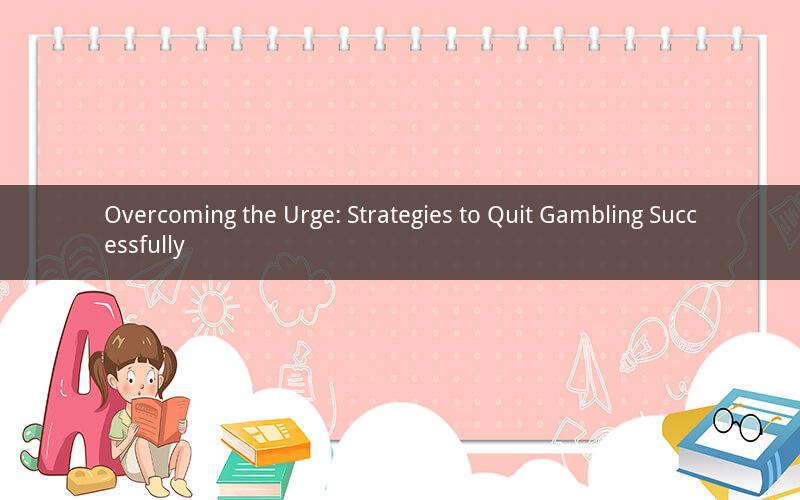
Introduction:
Gambling addiction is a complex issue that affects millions of individuals worldwide. Quitting gambling can be a challenging endeavor, but with the right strategies and support, it is possible to overcome this addiction and lead a healthier, more fulfilling life. This article delves into effective methods and resources that can help you quit gambling and maintain a gambling-free lifestyle.
1. Identify the Underlying Causes
Understanding the reasons behind your gambling addiction is crucial in developing a successful quitting plan. Common underlying causes include:
a. Emotional relief: Gamblers often use gambling as a coping mechanism to deal with stress, anxiety, or depression.
b. Financial gains: The allure of winning money can lead to a sense of excitement and power.
c. Social connection: Some individuals gamble as a way to connect with others or to feel part of a community.
By identifying the root causes, you can address the underlying issues and reduce the likelihood of relapse.
2. Set Clear Goals
Establishing specific, achievable goals is essential in the quitting process. Consider the following steps:
a. Define your "why": Understand the reasons why you want to quit gambling. This could be for your health, family, or financial stability.
b. Create a timeline: Set a realistic timeline for quitting, such as one month, three months, or six months.
c. Establish milestones: Break down your timeline into smaller milestones, such as cutting down on the number of bets or visiting a therapist once a week.
Remember to track your progress and celebrate your achievements along the way.
3. Seek Professional Help
A therapist or counselor specializing in gambling addiction can provide personalized guidance and support. Consider the following options:
a. Individual therapy: A therapist can help you identify the triggers and develop coping strategies to avoid relapse.
b. Group therapy: Joining a support group can provide a sense of community and allow you to share your experiences with others facing similar challenges.
c. Inpatient or outpatient rehab: These programs offer comprehensive treatment, including therapy, support groups, and educational workshops.
4. Develop Coping Mechanisms
Identifying and adopting healthy coping mechanisms can help you manage stress and cravings without resorting to gambling. Some effective strategies include:
a. Exercise: Regular physical activity can reduce stress and improve mood.
b. Mindfulness: Practices such as meditation, deep breathing, and yoga can help you stay grounded and focused.
c. Hobbies: Engaging in hobbies such as reading, painting, or gardening can provide a sense of accomplishment and distract you from the urge to gamble.
5. Avoid Triggers and High-Risk Situations
Identifying and avoiding triggers can significantly reduce the chances of relapse. Consider the following steps:
a. Stay away from casinos and other gambling venues.
b. Delete gambling apps and websites from your devices.
c. Limit exposure to gambling advertisements and media.
d. Inform friends and family about your commitment to quit gambling, so they can support you and help you avoid high-risk situations.
6. Create a Support System
A strong support system can provide encouragement, guidance, and accountability throughout your quitting journey. Consider the following options:
a. Friends and family: Share your goals and seek their support in your efforts to quit gambling.
b. Support groups: Joining a gambling addiction support group can provide a sense of community and mutual understanding.
c. Professionals: Maintain regular communication with your therapist or counselor, and consider attending group therapy sessions.
7. Be Patient and Persistent
Quitting gambling is a long-term process, and setbacks are a normal part of the journey. Remember the following tips:
a. Avoid self-blame: Understand that relapse is a part of the process, and it does not define your ability to quit.
b. Stay focused on your goals: Keep your reasons for quitting gambling at the forefront of your mind, and remember the positive changes it will bring to your life.
c. Stay committed: Stay dedicated to your quitting plan, and be open to adjusting your strategies as needed.
Conclusion:
Quitting gambling is a challenging but achievable goal. By identifying the underlying causes, setting clear goals, seeking professional help, developing coping mechanisms, avoiding triggers, creating a support system, and staying patient and persistent, you can overcome your addiction and lead a healthier, more fulfilling life.
Questions and Answers:
1. Q: Can I quit gambling on my own without professional help?
A: While it is possible to quit gambling without professional help, many individuals find it beneficial to seek guidance from therapists, counselors, or support groups. These resources can provide personalized support and coping strategies to increase your chances of success.
2. Q: How long does it take to quit gambling?
A: The duration of the quitting process varies from person to person. Some individuals may quit within a few weeks, while others may take several months or even years. The key is to stay committed and focused on your goals.
3. Q: What if I relapse?
A: Relapse is a common part of the quitting process. If you relapse, it's important to analyze what triggered the relapse and learn from the experience. Reconnect with your support system, adjust your strategies, and continue working towards your goal of a gambling-free lifestyle.
4. Q: Can I still enjoy the thrill of gambling without becoming addicted?
A: It's possible to enjoy gambling responsibly without developing an addiction. The key is to set limits on your gambling activities, be aware of your triggers, and avoid chasing losses or betting impulsively.
5. Q: Is there a genetic component to gambling addiction?
A: Yes, research suggests that genetics play a role in gambling addiction. If you have a family history of gambling addiction, it's essential to be extra cautious and seek support to reduce your risk of developing an addiction.